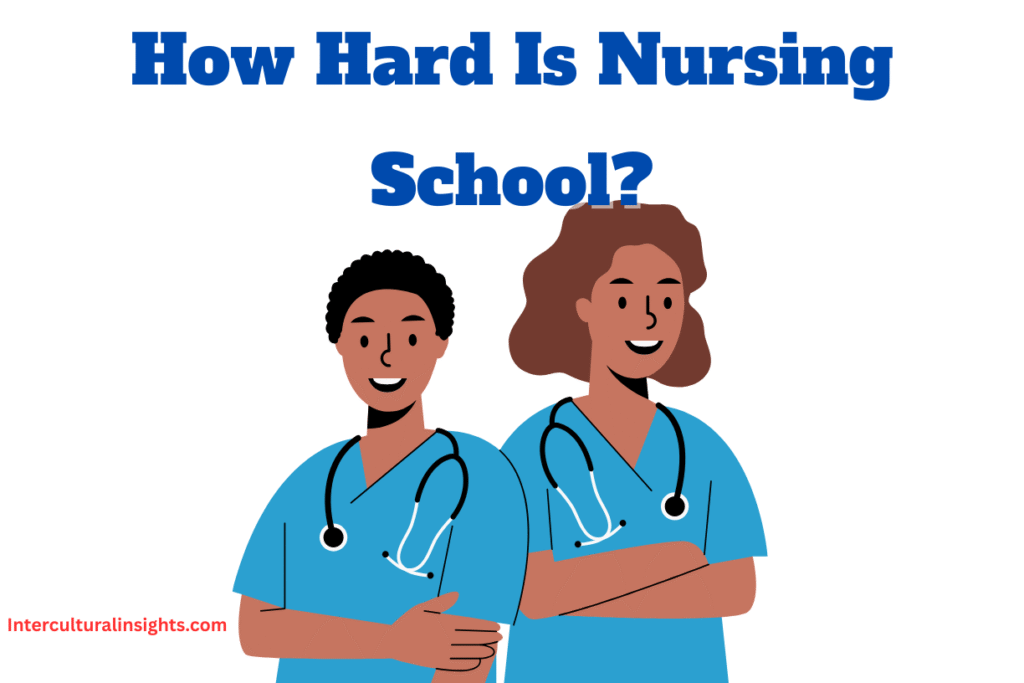Last Updated on May 21, 2025 by II Editor
Nursing school in 2025 is not for the faint of heart. It tests your stamina, intellect, and dedication. But it also rewards you with one of the most trusted, respected, and vital careers in healthcare. As medical technologies evolve and patient expectations rise, so do the demands on nursing students. But how hard is nursing school, really, in today’s academic and clinical climate?
Let’s break it down clearly—no fluff, no sugarcoating. Whether you’re a high school graduate, a career switcher, or someone looking to understand what modern nursing education entails, in this article, we will guide you through the realities, challenges, and triumphs of becoming a nurse in 2025.
Academic Expectations in 2025
Curriculums have evolved significantly. Nursing schools are integrating artificial intelligence (AI), data analytics, and telehealth simulations into their teaching. It’s no longer just about memorizing anatomy terms or administering injections. You now have to understand patient care within a technologically advanced environment.
Most nursing programs still offer two main academic tracks:
- Associate Degree in Nursing (ADN): Typically 2 years.
- Bachelor of Science in Nursing (BSN): Usually 4 years.
Regardless of the degree path, expect core classes such as:
- Pharmacology
- Human Anatomy and Physiology
- Pathophysiology
- Microbiology
- Mental Health Nursing
- Nursing Ethics and Leadership
Each course demands hours of reading, lab work, and exams. Professors expect you to show up, speak up, and master difficult topics quickly.
Clinical Training: The Real Test
This is where theory meets reality. Clinical rotations in hospitals and clinics are intense. You’ll learn to:
- Start IVs.
- Monitor vital signs.
- Assist in surgeries.
- Work in emergency rooms and maternity wards.
These real-world experiences are where many students either rise or burn out. You’re graded not just on what you know but how you apply it under pressure. And yes, you will likely work overnight shifts during rotations.
Many students describe clinicals as the most stressful but also the most rewarding part of nursing school. They teach you to think critically, communicate clearly, and prioritize patient safety.
Time Commitment and Workload
On average, nursing students dedicate 40–60 hours per week to their studies and clinicals. That includes:
- 15–20 hours of lectures.
- 10–20 hours of clinical rotations.
- 10–20 hours of studying, group work, and lab assignments.
Don’t expect much free time. Part-time jobs, while possible, often lead to burnout. Many successful students treat nursing school like a full-time job.
Emotional and Mental Health Challenges
Nursing school doesn’t just challenge your brain—it tests your heart.
- Compassion Fatigue: You’re constantly exposed to patient suffering.
- Imposter Syndrome: Many students feel they’re not smart or strong enough.
- Burnout: Long hours and high expectations can drain your energy quickly.
Successful programs now include wellness coaching, peer support groups, and access to therapy. You must learn to manage stress effectively to survive and thrive.
Technological Skills Are a Must
Gone are the days when nursing was all stethoscopes and charts. In 2025, nurses must master electronic health records (EHRs), AI-assisted diagnostics, virtual reality simulations, and digital medication administration systems.
Some nursing schools even require courses in:
- Data privacy and patient security
- Health informatics
- Machine learning basics
Tech-savviness can set you apart in both academics and job placements.
NCLEX-RN: The Final Barrier
Everything leads to this: the National Council Licensure Examination (NCLEX-RN).
In 2023, the test was redesigned to reflect clinical judgment more closely. That remains the case in 2025. It’s adaptive, meaning questions get harder as you answer correctly. You need to:
- Think critically under pressure
- Understand real-world scenarios
- Prioritize care decisions
Pass rates hover around 80% nationally, but your preparation determines everything. Many students begin NCLEX review six months before graduation.
Is It Harder Than Other Majors?
In many ways, yes.
Nursing requires a blend of science, empathy, speed, and precision. Unlike many majors, you must prove competence in a clinical setting before you graduate. There’s little room for error when lives are on the line.
You may envy your business or art major friends who seem to have more free time. But nursing offers one thing they might not: job security and purpose.
Financial Costs and Returns
Tuition varies widely:
- Public colleges (in-state): $10,000–$25,000 total.
- Private universities: $30,000–$70,000 total.
Additional costs:
- Textbooks and supplies: $2,000–$5,000.
- Uniforms and equipment: $500–$1,000.
- Licensing exams and background checks: $300–$600.
However, starting salaries for registered nurses in 2025 average $75,000–$90,000 annually, with strong growth in specialties like:
- Nurse practitioners
- ICU nurses
- Pediatric nurses
- Travel nurses
Some hospitals even offer tuition reimbursement and sign-on bonuses.
Strategies for Success
If you’re serious about making it through nursing school in 2025, consider these tips:
- Create a Study Routine: Consistency is your best ally.
- Find a Study Group: Collaboration helps retention.
- Use NCLEX Resources Early: Don’t wait until the end.
- Stay Organized: Calendars and planners are non-negotiable.
- Take Breaks: Burnout leads to mistakes.
- Ask for Help: From professors, tutors, or counselors.
Frequently Asked Questions (FAQs)
Is nursing school worth it in 2025?
Absolutely. Despite the challenges, nursing offers stable income, career flexibility, and the chance to make a difference.
How do I prepare before starting nursing school?
Review basic biology, brush up on medical terminology, and practice time management. Shadowing a nurse can also give you real insight.
Can I work while in nursing school?
It’s possible, but demanding. Many students work part-time jobs with flexible hours.
What happens if I fail a course?
Most schools allow one or two retakes, but repeated failures may lead to dismissal. Always seek support early.
How competitive is admission?
Very. Strong GPA, prerequisite grades, letters of recommendation, and sometimes entrance exams like the TEAS are crucial.
Will AI replace nurses?
Not likely. AI supports nurses, but empathy, intuition, and human connection can’t be automated.
Conclusion: The Hard Road Worth Taking
Nursing school in 2025 isn’t a walk in the park. It demands focus, sacrifice, and a thick skin. But if you’re up for the challenge, it also offers one of the most meaningful, secure, and impactful careers of our time.
You’ll graduate not only with knowledge but with courage, purpose, and a license to save lives. And in a world that’s always changing, that’s a hard-earned badge of honor worth every ounce of effort.









